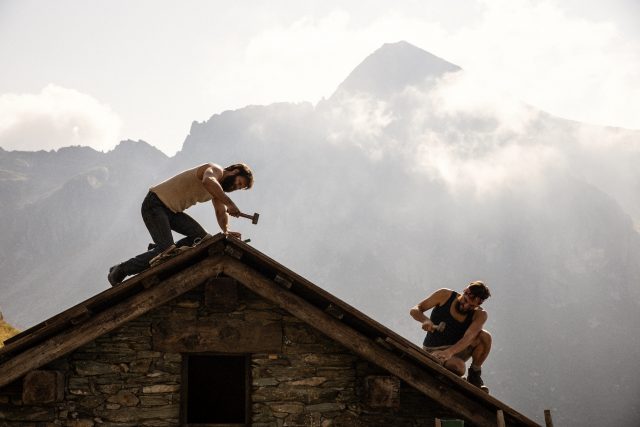
Located high in the Italian Alps, Grana is home to 183 residents, two shops, one bar and a school. It’s a charming mountain village surrounded by breathtaking beauty, and it’s where Pietro and his mother have come for the summer. Dad stayed back in Turin, busy with work, but soon this place will grab hold of him. It’ll grab ahold of Pietro, too, who’ll return to these mountains year after year, decade after decade.
Based on Paolo Cognetti’s 2016 novel, The Eight Mountains is a sweeping story covering four decades in the lives of Pietro (played as a child by Lupo Barbiero, as an adolescent by Andrea Palma and as an adult by Luca Marinelli) and his friend Bruno (played by Cristiano Sassella, Francesco Palombelli and Alessandro Borghi, respectively). Bruno is a resident of Grana, a descendant of the mountain people. He and Pietro strike up an immediate friendship, but a crucial factor separates them: Bruno cannot leave the mountains. He does not fit in modern society. So he builds his homes with his hands, makes cheese the way his ancestors did and lives his life according to the cadences of nature. Not so with Pietro the wanderer. He is as comfortable climbing the peaks surrounding Grana as he is walking the streets of Nepal.
Written and directed by Felix van Groeningen and Charlotte Vandermeersch, The Eight Mountains follows the form of a novel more than the propulsion of a film. That’s not to say The Eight Mountains isn’t one of the more visually striking and engaging watches you’ll see (it is) but to point out that the narrative feels looser than the average movie, less focused on the destination.
That’s because van Groeningen and Vandermeersch treat Pietro and Bruno as two threads intertwined. Bruno is the product of an abusive household, one that drove him from his drunken father into the arms of Pietro’s parents (Filippo Timi and Elena Lietti) around the same time Pietro decided to leave and strike out on his own. That makes Bruno and Pietro more like brothers than old friends. Then the father dies, and Bruno takes Pietro up the mountain and shows him where the old man wanted to build a home. Bruno is still going to build it, and Pietro will help.
They do, and life goes on. In the summer, the men return to the house and track the passage of time. Pietro begins to understand his father, and the paths Bruno and Pietro walk begin to diverge. Yet, the cabin calls them back: the center of their lives that, for the moment, still holds.
There’s a story Black Elk of the Ogalala Lakota people once told — a vision he had as a young boy. It was a prophetic vision where he saw the future from atop the sacred central mountain, which, for him, was Harney Peak in South Dakota (recently renamed Black Elk Peak in his honor). But, Black Elk continued, “The central mountain is everywhere.”
That seems to be the connective tissue holding Pietro and Bruno together, similar to how Ruben Impens’ jaw-dropping cinematography and a soundtrack laced with Daniel Norgen music binds the movie. The Eight Mountains — which won the Jury Prize at the 2022 Cannes Film Festival — is a memoir of two friends, an elegy for something lost but was beautiful while it existed.
ON SCREEN: The Eight Mountains opens in limited releases May 26.














